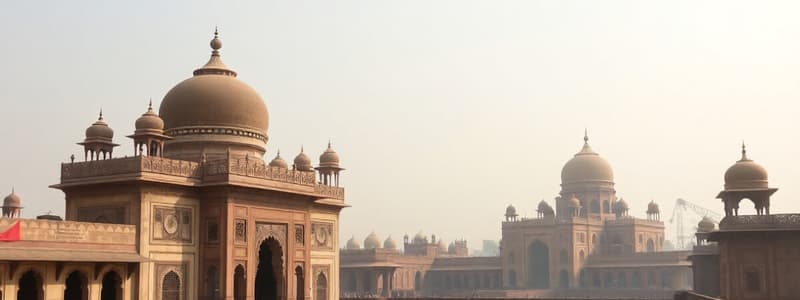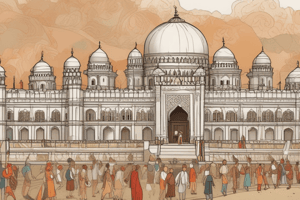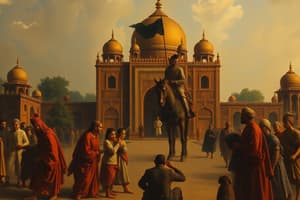Podcast
Questions and Answers
What did Bernier suggest about the motivation of artisans in the Mughal state?
What did Bernier suggest about the motivation of artisans in the Mughal state?
Bernier suggested that artisans lacked motivation to improve their products due to the state appropriating their profits.
How does Bernier describe the agricultural output of the Bengal region compared to Egypt?
How does Bernier describe the agricultural output of the Bengal region compared to Egypt?
Bernier described the Bengal region as extraordinarily fertile, outpacing Egypt in the production of rice, corn, and essential goods.
What role did the merchant class play in the economy according to Bernier's account?
What role did the merchant class play in the economy according to Bernier's account?
Bernier observed a flourishing merchant class engaged in extensive trade, suggesting a vibrant economic activity.
What types of commercial products did the region cultivate, according to Bernier?
What types of commercial products did the region cultivate, according to Bernier?
How did gold and silver flow into India as per Bernier's account?
How did gold and silver flow into India as per Bernier's account?
What factors contribute to the lack of laborers in the Hindustan Empire according to Bernier?
What factors contribute to the lack of laborers in the Hindustan Empire according to Bernier?
How does Bernier describe the relationship between landlords and peasants?
How does Bernier describe the relationship between landlords and peasants?
What does Bernier suggest about social stratification in Indian society?
What does Bernier suggest about social stratification in Indian society?
What warning does Bernier intend to convey regarding private property?
What warning does Bernier intend to convey regarding private property?
In what way does Bernier's account reflect the conditions of the countryside in the Hindustan Empire?
In what way does Bernier's account reflect the conditions of the countryside in the Hindustan Empire?
How did François Bernier's perspective on Mughal India differ from that of Ibn Battuta?
How did François Bernier's perspective on Mughal India differ from that of Ibn Battuta?
What was Bernier's view on landownership in Mughal India, and how did it differ from European practices?
What was Bernier's view on landownership in Mughal India, and how did it differ from European practices?
What consequences did Bernier associate with the crown ownership of land in the Mughal Empire?
What consequences did Bernier associate with the crown ownership of land in the Mughal Empire?
How did Pelsaert's observations of poverty in the Mughal Empire complement Bernier's views?
How did Pelsaert's observations of poverty in the Mughal Empire complement Bernier's views?
In what way did Bernier structure his representation of India compared to Europe?
In what way did Bernier structure his representation of India compared to Europe?
Flashcards
Bernier's perspective on Mughal India
Bernier's perspective on Mughal India
Bernier viewed Mughal India through a comparative lens, contrasting it unfavorably with Europe, particularly France.
Land ownership in Mughal India, according to Bernier
Land ownership in Mughal India, according to Bernier
Bernier believed the Mughal emperor owned all the land, hindering private property rights and long-term investment in agriculture.
Bernier's view on private property
Bernier's view on private property
Bernier strongly advocated for private property rights in land, believing it crucial for economic development.
Impact of land ownership on investment
Impact of land ownership on investment
Signup and view all the flashcards
Pelsaert's observation on poverty
Pelsaert's observation on poverty
Signup and view all the flashcards
Bernier's view of Indian peasantry
Bernier's view of Indian peasantry
Signup and view all the flashcards
Mughal Empire's peasant problems
Mughal Empire's peasant problems
Signup and view all the flashcards
Lack of laborers in India
Lack of laborers in India
Signup and view all the flashcards
Powerful ruling class
Powerful ruling class
Signup and view all the flashcards
Static rural society
Static rural society
Signup and view all the flashcards
Mughal artisans' motivation
Mughal artisans' motivation
Signup and view all the flashcards
India's trade surplus
India's trade surplus
Signup and view all the flashcards
Flourishing merchant class
Flourishing merchant class
Signup and view all the flashcards
Bengal's agriculture
Bengal's agriculture
Signup and view all the flashcards
Indian craft production
Indian craft production
Signup and view all the flashcards
Study Notes
A Warning for Europe
- Bernier warned that if European kings followed the Mughal model, their kingdoms would be far from well-cultivated and populated.
- He saw the Mughal Empire as a land of beggars and barbarians.
- Its cities and towns were ruined and filled with ill-air and pestilential marshes.
- Surprisingly, none of the Mughal official documents suggest that a state was the sole owner of land.
- The official chronicler of Akbar's reign suggested that the state was the sole owner of the land.
- Bernier's observations contained critical insights and reflection.
- His account contains discussions trying to place the history of the Mughals within a universal framework.
- He constantly compared Mughal India with contemporary Europe.
- He also ordered the perceived differences hierarchically, so that India appeared to be inferior to the Western world.
The Poor Peasant
- An excerpt from Bernier's description of the peasantry in the countryside:
- Of the vast tracts of country constituting the empire of Hindustan, many of them are little more than sand, or barren mountains, badly cultivated and thinly populated.
- Even a considerable portion of the good land remains untilled for want of labourers, many of whom perish in consequence of the bad treatment they experience from Governors.
- The poor people, when they become incapable of discharging the demands of their rapacious lords, are not only often deprived of the means of subsistence, but are also made to lose their children, who are carried away as slaves.
- In this instance, Bernier was participating in contemporary debates in Europe concerning the nature of state and society, and intended that his description of Mughal India would serve as a warning to those who did not recognise the "merits" of private property.
- Bernier described Indian society as consisting of undifferentiated masses of impoverished people, subjugated by a small minority of a very rich and powerful ruling class.
- There was no social group or class worth the name.
- Bernier confidently asserted: "There is no middle state in India".
Widespread Poverty
- Pelsaert, a Dutch traveller, visited the subcontinent during the early decades of the seventeenth century.
- He was shocked to see widespread poverty.
- "poverty so great and miserable that the life of the people can be depicted or accurately described only as the home of stark want and the dwelling place of bitter woe".
- Holding the state responsible, he says: "So much is wrong from the peasants that even dry bread is scarcely left to fill their stomachs".
Studying That Suits You
Use AI to generate personalized quizzes and flashcards to suit your learning preferences.



